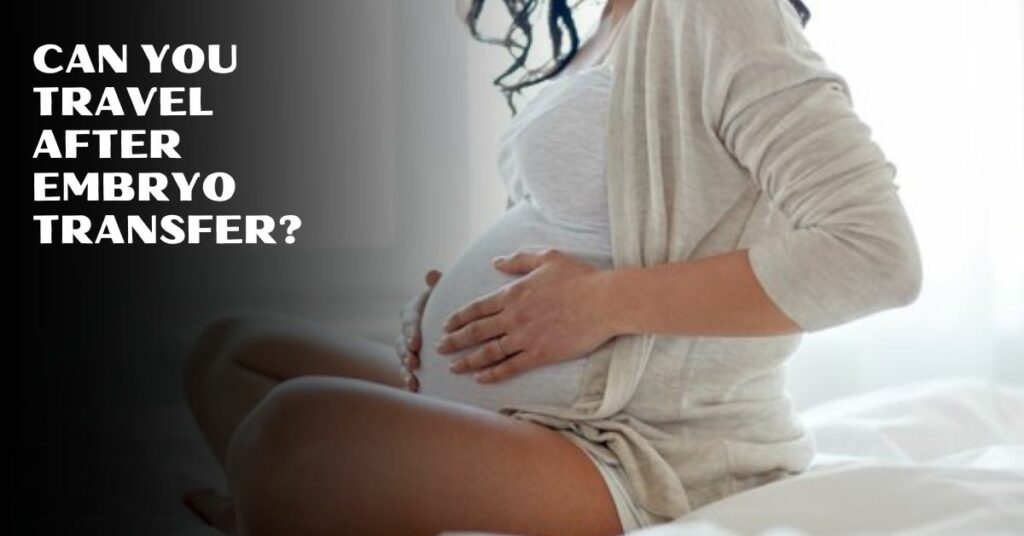For many couples, the process of in vitro fertilization (IVF) is a long and often expensive journey. After months of preparation, hormone treatments and medical appointments, the next step can be nerve-wracking: embryo transfer. But once it’s done, can you travel? It’s a common question for those considering IVF, so let’s take a look at what to consider when planning your trip after embryo transfer.
Embryo transfer is by far one of the most exciting steps in an IVF cycle. However, if you are thinking about traveling shortly after this procedure has been completed, there are some important things to keep in mind first. First and foremost, it is essential to understand that the success rate of IVF cycles depends on how well embryos attach themselves to the uterine wall during implantation – which occurs around seven days after embryo transfer. Therefore, it is generally recommended that couples wait until two weeks have passed before embarking on any type of travel plans.
In addition to potential risks associated with traveling right away after embryo transfer such as increased stress or exhaustion due to jet lag or time zone changes – another factor worth taking into consideration while making these decisions is whether or not you will be able to get adequate healthcare should something go wrong while abroad. While certain countries may offer great medical care options for those living overseas or even visiting temporarily – others may not have access to quality health services available closer to home. This could make any kind of emergency situation much more difficult (and costly!) than expected!
1. Understanding Embryo Transfer
Embryo transfer is a process that has revolutionized the world of fertility treatments, making it possible for dreams to come true like never before. It’s almost magical in its power and potential!
But what exactly is embryo transfer? In essence, it is an IVF procedure in which a single or multiple embryos are placed inside a woman’s uterus using specialized medical tools. This technique helps couples who have difficulty conceiving naturally achieve their dream of having children.
The benefits of this procedure are manifold: it can offer couples hope when all other attempts to conceive have failed; it allows them to start building their family sooner rather than later; and it eliminates any chance of passing on genetic diseases from one generation to another. All these advantages make embryo transfer an incredibly powerful tool and an invaluable asset for many hopeful parents-to-be.
Now that we’ve gained a better understanding of embryo transfer, let’s take a look at how you should prepare for the procedure.
2. Preparing For Embryo Transfer
Before preparing for an embryo transfer, it’s important to understand what the procedure entails. According to research from Harvard Medical School, more than 80 percent of women who have undergone IVF with their own eggs in the United States are successful when they reach their second trimester.
Preparing for an embryo transfer can be a complex process that requires careful attention and communication between the patient and healthcare provider. Patients should review any instructions given by their doctors before the procedure and make sure to bring along any special medications or supplements prescribed for use leading up to the transfer. Additionally, patients should take steps such as avoiding alcohol consumption and sexual intercourse close to the date of the procedure since these activities can interfere with fertility treatments.
It is also essential that patients ensure they will have reliable transportation on hand before undergoing an embryo transfer. They may need access to medical care quickly if complications arise following treatment, so having someone available to drive them home after the procedure is critical. Furthermore, many clinics recommend taking some time off work following an embryo transfer due to potential side effects like cramping or fatigue which could affect productivity at work.
3. What To Expect After Embryo Transfer
After the long road of preparing for embryo transfer, it is finally time to move into what comes next. It can be a bit disorienting when you are suddenly thrust out onto a new path and unsure of where to go or how to proceed. But with just a few steps, you will soon find yourself on more familiar territory.
What should you expect after your embryo transfer? Well, that depends entirely on the patient’s individual situation and their doctor’s advice. Generally speaking though, there are some common elements:
• Your doctor may have you take hormones or other medications
• You might need to get extra rest during this period
• Some light activity such as walking is usually encouraged
• Avoid strenuous activities including sports like running or weightlifting
• Regular check-ups may be necessary at various points after the procedure
It is important to stay in close contact with your healthcare provider both before and after an embryo transfer so they can give tailored guidance and provide quality care throughout the process. From there, the doctors can help determine if air travel would be safe for each person given their unique medical history. This means understanding not only any physical constraints but also mental health considerations too – all factors must be taken into account before making decisions about airplane travel post-embryo transfer. With careful consideration of these issues, patients can find peace of mind knowing that whatever direction they decide upon will lead them safely onwards towards their goals.
4. Is Air Travel Safe After Embryo Transfer?
Journeying just after jostling an embryo transfer can be a daunting decision. With the many questions and concerns that come along with traveling post-transfer, it’s important to understand the risks associated with air travel. Before booking flights, patients should carefully consider if they are up for the challenge of soaring through the sky soon after such a medical event.
Air travel can be risky based on individual circumstances and needs following embryo transfer. Patients may need to consult their doctor before taking off in order to ensure safety and get advice about any necessary precautions or accommodations needed during flight. Generally speaking, doctors recommend avoiding long haul flights for at least three days post-transfer as well as refraining from flying altogether when pregnant due to potential exposure to radiation while in transit.
Apart from health considerations, there are other factors to take into account when deciding whether or not to fly shortly after transferring embryos. Discomfort is likely given changes in cabin pressure which could lead to feelings of nausea or dizziness––a common side effect among those who have recently undergone this procedure––and so making sure comfort levels are taken into consideration is essential prior embarking on any journey by plane.
Whether you decide it’s best to stay grounded or continue your voyage through the skies, remembering these components will help make sure your travels remain safe and comfortable after undergoing an embryo transfer procedure.
5. Avoiding Stress After Embryo Transfer
After successful embryo transfer, the end is just the beginning. It’s a delicate time and each step of the post-transfer process can have an impact on the outcome. Staying stress free after embryo transfer is one of those essential steps for achieving pregnancy success.
The emotional journey of IVF can be overwhelming and there are no hard-and-fast rules when it comes to managing stress levels during this period. But whatever works best for you in reducing tension should be incorporated into your daily routine. Some people find that simple activities like deep breathing or meditation help them relax; while others may prefer more physical pursuits such as yoga, jogging, or swimming. Talking with friends or family members about your anxiety can also provide much needed relief from built up pressure.
It’s important to remember that self care isn’t selfish – it’s necessary! Setting aside some ‘you’ time every day can make all the difference and allow you to approach motherhood with a positive attitude. Now that avoiding stress has been addressed, let’s move onto another vital part of preparing for pregnancy: staying hydrated after embryo transfer.
6. Staying Hydrated After Embryo Transfer
Traveling can be likened to a journey through life, each step of the way offering its own challenges and rewards. At times this voyage may require additional care and attention, such as after an embryo transfer. Staying hydrated is one important way to ensure that your body has what it needs for optimal health during this process.
Just like going on a long car ride or hike with no water in sight, not drinking enough fluids can leave you feeling parched and exhausted in a very short amount of time–the same goes for post-embryo transfer. Drinking plenty of water throughout the day helps maintain blood volume, which allows nutrients and hormones to travel throughout the body more easily. This can greatly reduce cramping, headaches and mood swings that are common side effects of hormone replacement therapy following embryo transfer.
To stay properly hydrated when traveling after embryo transfer, make sure to bring along a reusable bottle filled with filtered tap or mineral water so you don’t have to rely on finding bottled water while away from home. Additionally, try adding sliced lemons or limes into your drink for added flavor as well as vitamins that promote healthy fetal development if conception takes place. Taking these steps will help keep dehydration at bay, allowing you to enjoy your travels without worry or discomfort.
7. Eating Healthy After Embryo Transfer
Once the embryo transfer is completed, it’s important to make sure you’re eating healthy. This means avoiding processed and sugary foods that can cause inflammation and other health issues. Eating a balanced diet with plenty of nutritious fruits and vegetables will help ensure your body has enough energy to recover from the procedure while providing essential vitamins and minerals for optimal health.
Additionally, take care to limit caffeine intake since too much could be detrimental. Foods high in omega-3 fatty acids, like salmon or sardines, are also beneficial because they have anti-inflammatory properties and may reduce risk of complications during the implantation process. Drinking lots of water throughout the day can also aid in digestion as well as assist your body’s functions after the embryo transfer.
Taking care of yourself nutritionally following an embryo transfer is key in ensuring you give your body what it needs to grow a healthy baby. Your doctor should provide further guidance on nutrition before, during, and after the procedure so that you have an understanding of what works best for your unique situation. With proper nutrition, you’ll create an environment that supports successful implantation for your developing fetus – and maybe even get a good night’s sleep!
8. Avoiding Certain Activities After Embryo Transfer
The day you’ve been waiting for is finally here. You’ve undergone the embryo transfer and now it’s time to rest and relax, right? Well, not exactly. While there are many things that should be done after an embryo transfer, such as eating healthy foods or having regular check-ups, avoiding certain activities can also play a vital role in increasing your chances of success.
It’s important to understand what type of activity should be avoided during this period. For example, strenuous physical activity like running or weightlifting may interfere with implantation and cause complication. Additionally, sexual intercourse should also be avoided since orgasm can trigger uterine contractions, which could disrupt the process of implantation. It might sound quite difficult but these simple steps taken before pregnancy will help you create the best possible conditions for your embryos to grow and develop into a healthy baby!
Therefore, it’s essential to take care when participating in activities post-embryo transfer so that everything goes according to plan. Taking some extra precautions now will go a long way towards ensuring a successful outcome down the line – seeking medical advice before traveling after embryo transfer being one of them.
9. Seeking Medical Advice Before Traveling After Embryo Transfer
Venturing out after a successful embryo transfer can be both exciting and daunting. The thought of taking an adventure while also protecting your fertility is enough to make any traveller hesitant. But with the right guidance, you’ll be able to experience new places without compromising on safety or health. This article will explore seeking medical advice before traveling after embryo transfer – so that you don’t miss out on the fun!
When it comes to planning a vacation post-embryo transfer, it’s important to seek medical advice first. While each case may differ depending on individual circumstances, consulting your doctor or IVF clinic is essential in determining whether travel is safe for you during this time. It’s best to provide as much detail about your journey as possible (such as flight duration and destination) so that they can advise accordingly. And if there are any concerns, they’ll suggest alternative arrangements such as ground transportation instead of flying or other options available within reason particularly when travelling long distances.
Considering the fact that no two journeys are ever the same, speaking with healthcare professionals about potential risks associated with air travel (including changes in air pressure and radiation exposure) is highly recommended too – even if the chances seem minimal. Additionally, asking questions related to jet lag and its effects on fertility could prove beneficial in order to ensure a smooth trip from start to finish.
By arming yourself with all necessary information prior to traveling, you’ll have peace of mind knowing that everything has been taken into consideration for a safe trip ahead – regardless of where life takes you next!
10. Tips For Traveling After Embryo Transfer
When considering to travel after embryo transfer, some important tips should be kept in mind. It’s advisable to seek medical advice prior to planning any trips and make sure you are aware of all the risks involved.
Before embarking on your journey, it’s essential to have a detailed discussion with your doctor about potential activities that might put you at risk during pregnancy. This includes avoiding strenuous physical activity or contact sports, refraining from long-haul flights, and steering clear of areas with poor sanitation and hygiene standards. You’ll also need to ensure that you get enough rest; taking regular breaks throughout the day will help keep stress levels low and reduce fatigue.
It is equally important to pack wisely for your trip: take along plenty of snacks rich in protein, iron and calcium; stay hydrated by carrying water around wherever possible; wear comfortable clothing suited for your destination’s climate; bring medications prescribed by your doctor; carry an emergency kit including bandages, antiseptic wipes, painkillers etc.; and follow safety guidelines provided by local authorities such as wearing face masks when necessary.
By following these simple steps while traveling after embryo transfer, you can help ensure a safe and enjoyable experience.
Frequently Asked Questions
How Long After Embryo Transfer Should I Wait Before Traveling?
It is an incredibly daunting prospect to consider traveling after embryo transfer. It is a decision that should not be taken lightly, as it could potentially have serious ramifications for one’s health and wellbeing. Therefore, any would-be traveler must ask themselves the question: how long after embryo transfer should I wait before traveling?
The answer to this question depends on several factors such as the type of travel being considered, the individual’s medical condition, and their own recovery process from the transfer procedure. Generally speaking, most doctors advise waiting at least two weeks following the embryo transfer before embarking on any kind of trip. This is done in order to ensure that there are no complications or risks associated with traveling during this delicate period.
This two week window can seem like an eternity when planning a much-needed holiday or business trip; however patients must remember that taking extra care post-transfer is essential if they wish to protect their health and maximize their chances of conception success. With this in mind, it is wise to err on the side of caution when considering travel plans and always check with your doctor beforehand if you’re unsure about anything related to your unique situation.
Is It Safe To Fly After Embryo Transfer?
When it comes to traveling after embryo transfer, the best advice is to speak with your doctor. Flying in particular may be a concern due to changes in air pressure and possible exposure to germs while on board. It’s important that you understand any potential risks before embarking on any journey.
Your doctor will likely advise against flying within three days of an embryo transfer, as this can increase the risk of complications such as infection or implantation failure. However, if you are feeling well and have been given clearance from your healthcare provider, then it may be safe for you to fly.
It’s always essential to take care when travelling after medical treatments like IVF. Make sure you bring along all relevant documents relating to your treatment so that they are readily available should you need them. Keep some snacks and water with you too, as long flights can be tiring and dehydrating.
TIP: Speak with your doctor beforehand about taking precautions such as wearing compression stockings during the flight in order to improve circulation and reduce swelling – especially if there is a significant time difference between where you are flying from and where you’re going!
Is It Safe To Travel By Car After Embryo Transfer?
When it comes to travelling after embryo transfer, many couples are concerned about the safety of their unborn child. While some may be tempted to fly in order to get to their destination quicker, driving is the best option for couples who have recently undergone an embryo transfer. Driving can be a safe and reliable way to travel during this time if certain precautions are taken.
The first step is making sure that you take regular breaks throughout your journey so that your body has enough rest while also avoiding too much stress on your lower back from sitting in one position for extended periods of time. It’s important to stay hydrated as well, especially since dehydration can lead to cramps or contractions which could potentially harm the fetus. Additionally, wearing supportive clothing such as bandages will provide extra support against any potential abdominal pains caused by driving on bumpy roads.
Another precautionary measure is ensuring that you don’t drive for more than four hours at a stretch without taking any significant breaks-this not only prevents fatigue but also reduces the risk of any accidents occurring due to drowsiness or other factors. As long as these guidelines are followed and all necessary steps are taken, travelling by car should be a safe and comfortable experience even directly following an embryo transfer procedure.
What Activities Should I Avoid During Travel After Embryo Transfer?
Recent studies have shown that up to 70% of women will experience some level of discomfort during or after an embryo transfer. As such, it is important for those who plan to travel afterwards to be aware of what activities they should avoid in order to reduce the risk of any potential complications. This article will discuss what activities should be avoided when travelling after an embryo transfer.
One activity which should definitely be avoided by anyone travelling after an embryo transfer is strenuous physical exercise. Anything from running and swimming to playing sports like tennis or basketball should all be avoided as these can cause too much strain on your body, potentially affecting the implantation process. Additionally, heavy lifting or carrying anything substantial also carries a high risk and could put additional stress on the uterus, leading to further issues.
It’s equally important not to let yourself become overtired while travelling after an embryo transfer either – this includes avoiding long-haul flights if possible due to sitting for extended periods of time and being exposed to air pressure changes at altitude. Likewise, getting adequate rest is essential, so try not to stay out late sightseeing or partying! Taking regular breaks throughout the day and listening to your body are both key pieces of advice here – if you feel exhausted then take a break and do something relaxing instead until you’re feeling better again.
Travelling post-embryo transfer doesn’t mean sacrificing all forms of fun though – just make sure you keep within sensible limits when it comes to physical exertion so that you don’t negatively impact the success rate of your procedure!
What Should I Do If I Experience Any Symptoms While Traveling After Embryo Transfer?
Traveling after embryo transfer can be an exciting and momentous experience. But it is also important to remember that during this time, you should remain aware of your body’s changes and condition as well as any potential symptoms or signs which may occur while on the road. This can feel overwhelming but being prepared in advance will ensure that if something happens, you know just what to do.
One symptom to look out for during travel after embryo transfer is fatigue. If you are feeling more tired than usual, take some extra rest stops along your journey and make sure to drink plenty of water throughout the day. Additionally, pay close attention to how stress affects your body – try some relaxation techniques like deep breathing or taking a short walk if possible – this could help ease any anxieties you have about traveling with an embryo transfer.
If other symptoms start manifesting such as cramps, discomfort or spotting, contact your doctor immediately for advice on how best to proceed. Also keep in mind that depending on where you are travelling there might not always be immediate access to medical care, so preparing ahead by researching local hospitals or clinics nearby is wise before embarking on a trip post-transfer. Having all these precautions taken care of will give you peace of mind when moving through unfamiliar places and allow you to enjoy the journey without worry!
Conclusion
It’s understandable to be worried about traveling after an embryo transfer. After all, you want to make sure your embryos have the best chance of implantation. However, if you take some simple precautions and follow your doctor’s advice, there’s no reason why a short trip can’t be done safely. As long as you are mindful of what activities might put undue stress on your body and don’t push yourself too hard, you should be able to travel without any problems.
So don’t let worries stop you from going anywhere; just use common sense and caution when it comes to pregnancy-related activities like air travel or long car journeys. And remember: even though an embryo transfer is often described in terms of “waiting for results”, that doesn’t mean life has to grind to a halt until then – go ahead and enjoy yourself! After all, this could be the start of something truly magical – so sprinkle it with optimism like confetti!

Meet Michael Graham, the main author of SeekTraveler.com. With a wanderlust that knows no bounds, Michael has traversed more than 30 countries across the globe. From sun-soaked Caribbean islands to the ancient marvels of Europe and the captivating charm of Japan, he has witnessed the wonders of diverse cultures firsthand. Michael’s in-depth knowledge and contagious enthusiasm for travel will inspire you to pack your bags and embark on your own extraordinary journey.



